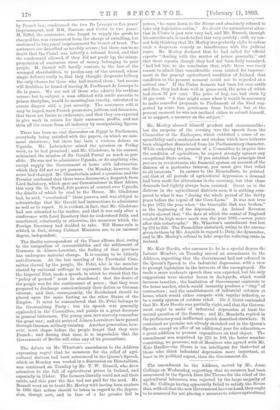The debate on Mr. Wharton's amendment to the Address expressing
regret that no measures for the relief of agri- cultural distress had been announced in the Queen's Speech, which on Monday was wasted in a discussion on Bimetallism, was continued on Tuesday by Mr. T. W. Russell, who drew attention to the fall of agricultural prices in Ireland, and especially in 'Ulster. The farmers literally could not sell their cattle, and this year the flax had not paid for the seed. Mr. Russell went on to taunt Mr. Morley with having been anxious in 1886 that action should be taken in regard to the depres- sion, though now, and in face of a far greater fall in prices, "he came down to the House and absolutely refused to take any legislative action." No doubt the agricultural situa- tion in Ulster is just now very bad, and Mr. Russell, through his constituents, is made to feel this very acutely; still, we can- not help thinking that Mr. Morley was perfectly right to refuse such a desperate remedy as interference with the judicial rents. Mr. Morley declared that he had called for official reports "dealing with the matter of prices generally," and that these reports, though they had not been fully examined, "had led him to the conclusion that, while there was every reason to admit that considerable room existed for improve- ment in the general agricultural condition of Ireland, that condition at the present moment could not be regarded as a critical one." If the Ulster farmers had been hit over cattle and flax, they bad done well in grass-seed, the price of which had risen 22 per cent. The price of hay, too, had risen by 36 per cent. " A time might come when it would be necessary to make remedial proposals to Parliament of the kind sug- gested by some hon. gentlemen from Ireland; but at the present moment he was not inclined either to submit himself, or to support, a measure on the subject."


































 Previous page
Previous page